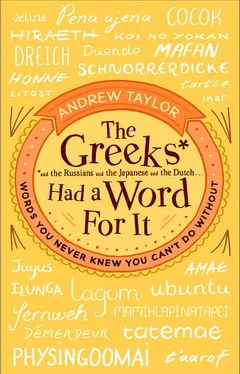Visitors to Iran are sometimes warned that the expectation is that they should refuse any offer three times, but in reality t’aarof is less prescriptive and more subtle than this. Deep down, it’s about each party to the discussion wanting to show respect to the other. It’s a phenomenon that’s familiar enough in the English-speaking world and one which we ought to learn to deal with rather than squirm over. Perhaps if we had a word for it – like t’aarof – we might manage the embarrassment of it a little better.
The weight gained through overeating when grief-stricken
Occasionally, politicians have to make sacrifices for their country – perhaps even put themselves through near-torture in the interests of diplomacy. In the 1980s, it was Margaret Thatcher’s turn.
The Prime Minister was visiting the then German chancellor, Helmut Kohl, at his home near Ludwigshafen on the Rhine. National leaders always like to show off the culinary delicacies of their own country, and so Kohl invited her to lunch at a local tavern – not an environment in which the Iron Lady was at her most comfortable. Her idea of a good lunch was a nice piece of delicately grilled Dover sole, and she visibly blanched as her plate was piled high with Saumagen – stuffed pig’s stomach – with mounds of sauerkraut and potatoes to go with it. She did her best but was still picking rather primly at it as Chancellor Kohl, who was known to be a monumental trencherman, returned for his second helping. And then his third. Mrs Thatcher survived the experience with her dignity and her good humour intact – just.
The point is that, fairly or unfairly, the Germans have a reputation for being expansive about their food and drink. The British are known for their love of beer, but a nation that consumes its lager from one-litre steins is never likely to come second in a drinking contest. And German cookery, as Mr Kohl demonstrated, is better known for the generosity of its portions than for the delicacy of its preparation.
The Germans – at least according to reputation – have never needed an excuse to grow large and imposing. Again, Chancellor Kohl might be quoted as an example. So why does a nation like that need a word like Kummerspeck ?
Kummerspeck ( KOOM-ar-shpek , with the oo as in book ) is the Germans’ ideal excuse for putting on unwanted weight. It means literally ‘grief-bacon’, and it refers to the extra weight gained as a result of overeating through grief. The ‘bacon’ part of the word ( speck ) doesn’t refer to the crispy slices of heaven that go with eggs for breakfast but to the unmovable deposits of fat that build up relentlessly under your skin. But it is the ‘grief’ part – kummer – that is the masterpiece of the word as an excuse.
Kummer means grief, sadness or general sorrow. You have only to say it and you have disarmed criticism at once – what sort of person is going to make someone who has just told them that they are grief-stricken, sorrowful and world-weary feel even worse by telling them they’re getting fat?
Kummerspeck acknowledges the fact that among the most popular items of self-medication for sadness and distress are tubs of ice cream, chocolate brownies and chips, and draws attention to their fairly obvious side effects. But why does a nation like Germany, whose recipe books and restaurants suggest that they need no excuses for eating and drinking with more enthusiasm than wisdom, need an excuse anyway?
Well, so much for national stereotypes. The statistics tell a different story. They show that if anyone needs an excuse for piling on weight it’s the British. English speakers in Europe – the UK and Ireland – occupy two of the top three places in the Organisation for Economic Co-operation and Development’s European league table of obesity, with only Hungary above. The Germans, for all their pigs’ trotters and apple strudels and immense steins of lager, are a svelte and highly respectable seventeenth.
Given it’s the Brits who are guilty of shovelling in the fish and chips, double-size burgers and cream cakes, we do need an excuse for such poor eating habits, and kummerspeck could be the one. We should be thankful to the Germans for providing us with the word and take it to our hearts – where those fatty deposits are busy constricting our arteries – at once.
A joke so unfunny you have to laugh
When your children are small, you want to make them laugh and be happy, and so you tell them jokes – simple jokes, the sort they’ll understand, with puns and pratfalls and probably a few rude noises as well. They will want to please you in return, in the way that children do, and so, even though they haven’t had the chance yet to learn what sort of things really are funny, they laugh.
And so you believe that you have told them a funny joke and go on to repeat the performance, again and again. That loud click you may or may not hear at around this point is the sound of the trap snapping shut: you are now telling Dad-jokes, and the habit will enslave you. Since parents never notice their children growing up, you will probably continue to do it, if they let you, well into their teens and possibly beyond. Finally, you will be telling Grandad-jokes, from which sad fate there is definitely no escape.
The Indonesians clearly understand this predicament, since they have a word to describe both the joke and the person who tells it – jayus (jie-OOS). It’s a joke that simply isn’t funny and neither is the person who tells it – a joke, in fact, that fails so completely that the hearer has to laugh because it is so bad.
It doesn’t apply only to men or fathers. Teachers are another group particularly prone to jayus . It’s a word that belongs originally to the informal language of Indonesia, bahasa gaul , which is generally used in day-to-day conversation and in popular newspapers and magazines, and so it’s a way to deflate authority or pomposity.
It’s more than just a bad or a lame joke. It may be the quality of the telling that makes a jayus rather than the story itself, but the laughter that it causes comes in relief that the performance is over, in surprise that anyone could tell such a bad joke, or in mockery of the poor sap who has tried so hard and so ineffectually to be funny.
It’s certainly not polite, sympathetic laughter, to make the joke-teller feel better, because that would be a deliberate and purposeful decision, and the response to a jayus is as instinctive and irresistible as a genuine belly laugh. In fact, just like the self-deluding, joke-telling dad, the jayus may take the laughter at face value and continue to believe that he is a natural-born comedian.
And that, of course, is a joke in itself – just not the one he thought he was telling. The joker has become the joke, which, for all the pleasure it may give his listeners, is not a place anyone would like to be. But there are worse things to be than a jayus . A world that contains Dad-jokes also contains Dad-dancing. And no language on earth, thank God, has a word for that.
A bit of a mess that can be sorted out & a hideous mess that is almost irreparable
Back in 2007, the Scottish National Party came to power in Edinburgh after an election that had been beset by problems and controversy. In fact, commented the BBC’s Scottish political editor, Brian Taylor, it had been a ‘voting guddle ’ ( GUDD-ull ). But it was worse than that, he went on: ‘The authorities are saying: (1) we couldn’t get all the ballot papers out; (2) they were so complex, people couldn’t fill them in; (3) when they finally filled them in, we couldn’t count the blasted things! There’s a splendid Gaelic word, bourach . It means an utter, hideous mess. This is bourach , Mach Five.’ [24] Brian Taylor, report on Holyrood election 2007 http://www.bbc.co.uk/blogs/election07/scotland/2007/05/ah_bourach.html).
Читать дальше












